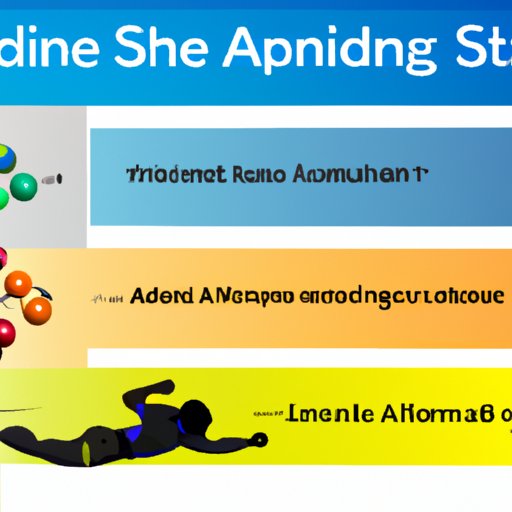Introduction
Adrenaline is a hormone produced by the adrenal glands that provides a burst of energy when you’re in a stressful or exciting situation. Also known as epinephrine, adrenaline has many physiological effects that help your body respond to and cope with physical and emotional threats. This article will explore the science behind how adrenaline works and its impact on health and performance.

Exploring the Physiology of Adrenaline: How It Works in the Body
Adrenaline is a key player in the body’s fight-or-flight response, which helps you to prepare for an emergency. When the body perceives a threat, the brain sends signals to the adrenal glands to release adrenaline into the bloodstream. From there, it travels throughout the body and triggers a series of physiological responses.
Overview of Adrenaline’s Role in the Body
Adrenaline plays a crucial role in the body’s response to stress. It increases heart rate and blood pressure, dilates air passages, and boosts energy levels. It also allows the body to respond quickly in times of danger or excitement. According to a study published in the journal Nature Reviews Neuroscience, “Adrenaline increases alertness and arousal, allowing for enhanced cognitive performance and reaction times.”
Physiological Effects of Adrenaline
Adrenaline has many physiological effects that help the body respond to stress. These include:
- Increased heart rate and blood pressure
- Rapid breathing
- Dilated pupils
- Reduced digestion
- Decreased sensitivity to pain
- Heightened senses
- Increased focus

The Science Behind Adrenaline Rush: What Causes Adrenaline to Spike
Adrenaline is released in response to both physical and emotional stress. The intensity of the response depends on the perceived level of threat. Exciting activities like roller coasters or extreme sports can also trigger an adrenaline rush.
Stress as a Trigger for Adrenaline
Stress is one of the most common triggers for adrenaline. When the body perceives a threat, it releases adrenaline to prepare the body for fight or flight. According to a study published in the journal Brain Research, “The primary role of adrenaline is to facilitate the body’s response to stressors, either real or imagined.”
Other Factors That Can Increase Adrenaline Levels
In addition to stress, other factors can also cause adrenaline levels to spike. These include:
- Caffeine
- Exercise
- Certain medications
Understanding the Impact of Adrenaline on Your Health and Performance
Adrenaline can have both positive and negative effects on health and performance. It can help you react quickly in dangerous situations and improve your focus and concentration. However, too much adrenaline can lead to anxiety, panic attacks, and even physical exhaustion.
Positive Effects of Adrenaline
Adrenaline can have a number of positive effects on health and performance. These include:
- Increased alertness and focus
- Enhanced reaction time
- Improved athletic performance
- Heightened senses
Negative Effects of Adrenaline
Adrenaline can also have negative effects on health and performance. Prolonged exposure to high levels of adrenaline can lead to physical and mental exhaustion. It can also cause anxiety, irritability, and difficulty sleeping. According to a study published in the journal Psychosomatic Medicine, “Chronic stress and elevated levels of adrenaline can increase the risk of cardiovascular disease and other chronic illnesses.”
How to Harness the Power of Adrenaline for Maximum Results
Adrenaline can be a powerful tool for improving health and performance. By managing your adrenaline levels, you can maximize the positive effects while minimizing the negative ones.
Strategies to Manage Adrenaline
There are several strategies you can use to manage your adrenaline levels. These include:
- Deep breathing exercises
- Meditation
- Physical activity
- Getting enough sleep
- Limiting caffeine intake
Benefits of Managing Adrenaline
Managing your adrenaline levels can have many benefits. It can help improve focus and concentration, reduce stress and anxiety, and boost overall health and performance.

Common Myths About Adrenaline: What You Need to Know
Despite its importance, there are many misconceptions about adrenaline. Here are three common myths about adrenaline, and what you need to know.
Myth 1: Adrenaline Makes You Stronger
It’s true that adrenaline can increase strength and endurance, but only temporarily. Over time, prolonged exposure to high levels of adrenaline can lead to physical and mental exhaustion.
Myth 2: Adrenaline Is Only Released in Emergency Situations
While adrenaline is primarily released in response to danger or stress, it can also be triggered by exciting activities like sports or roller coasters. According to a study published in the journal Neuropsychopharmacology, “Adrenaline is released not only in response to threats, but also during pleasurable experiences.”
Myth 3: Adrenaline Is Always Bad
Adrenaline can have both positive and negative effects on health and performance. While too much adrenaline can lead to anxiety and fatigue, moderate levels can help improve focus and reaction time.
Conclusion
Adrenaline is an important hormone that helps the body respond to physical and emotional stress. It has many physiological effects that can improve health and performance. However, too much adrenaline can lead to anxiety, panic attacks, and physical exhaustion. By understanding how adrenaline works and learning how to manage it, you can harness its power for maximum results.
(Note: Is this article not meeting your expectations? Do you have knowledge or insights to share? Unlock new opportunities and expand your reach by joining our authors team. Click Registration to join us and share your expertise with our readers.)
